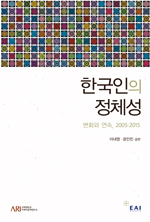
South Korean Identity: Change and Continuity, 2005-2015
Korean Identity | Books | 2016-08-19
By Nae-Young Lee and In-Jin Yoon
|
This book is an attempt to investigate how South Korean identity and values have changed over the last ten years, and how they have remained the same. This book was written using data collected from the South Korean Identity Survey, which is jointly administered by the East Asia Institute, the Korea University Institute for Asia, and the Joongang Ilbo. The survey covers a diverse array of topics including the multifaceted South Korean identity and values, perceptions of past historical events, social participation, perceived conflicts, perceptions of the international world, and so on. Furthermore, as a longitudinal survey that has been conducted three times over the last ten years, the South Korean Identity survey has increased academic value and utility in capturing the long-term changes occurring in South Korean society compared to a cross-sectional study. |
"Assessing the future of South Korean society through an analysis of the changes in South Korean national identity"
10 years of change for the nation- how has South Korean society changed?
Over the past ten years, South Korea’s birth rate has remained abysmally low (The total birth rate is less than 1.3). With this low birth rate, the ageing of society has been accelerating. Economic inequality has worsened, and the youth unemployment rate has skyrocketed since 2012. Security concerns over North Korea’s ongoing nuclear tests and missile launches have also grown. On the other hand, South Korea’s population has increasingly diversified owing to globalization and opening. The number of non-Korean residents in the country has steadily increased, surpassing 1,740,000 in January of 2015. These changes have had a significant influence on the identity and values of the Koreans who have endured them. The book South Korean Identity tracks and analyzes these changes and assesses the future of South Korean society.
 Table of Contents
Table of Contents
I. Perceptions of Local Community and Multiculturalism
1. The South Korean Community and Neighborhood Identity ■ Sook-Hee Oh
2. Multilayered South Korean Identity and the Future of National Multiculturalism: Who Imagines a Multicultural Nation? ■ Jung-Mee Hwang
3. South Korean Multiculturalism and Changes in Perceptions of Multicultural Minorities: From Compassion to Indifference? ■ In-Jin Yoon
II. Perceptions of Citizens and the State
4. South Koreans' Participation in Voluntary Associations and Citizenship ■ Seokho Kim
5. Changes in Citizen Perceptions of the Government’s Role ■M. Jae Moon• Tae-Hyung Kim
6. Is Post Materialism on the Rise among South Koreans? ■ Joon Han
III. Social Conflicts and Perceptions of North Korea•Unification•The International Community
7. Changes in Perceptions of Social Conflicts in South Korea, 2005-2015 ■ Won-Taek Kang
8. Changes in South Korean Perceptions of North Korea and Unification, 2005-2015 ■ Nae-Young Lee
9. Changes in South Korean Perceptions of the US and China in Response to Escalating Competition between the US and China in East Asia ■ Jung-Nam Lee and Do-Hyung Ha
*This media note was translated from the original Korean by Natalie Grant.
Center for Public Opinion Research
Korean Identity
Books
Changing Korean Voters 6: The 19th South Korea’s Presidential Election through Candle Light Protest and Impeachment
Won-Taek Kang | 2016-08-19
Books
U.S.-China Competition in the Architecture of a Regional Order in the Asia-Pacific
Young-Sun Ha | 2016-08-19